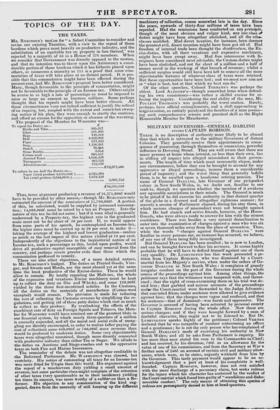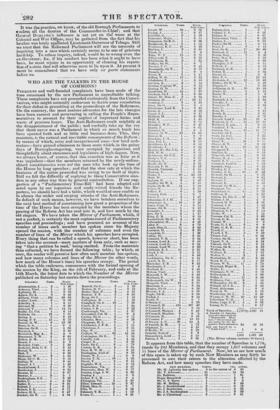MILITARY GOVERNORS—GENERAL DARLING versus CAPTAIN ROBISON.
THERE is no description of authority more likely to be abused than that which is intrusted to the military Governors of distant
Colonies. They generally receive their appointments in conse-
quence of possessing, through themselves or connexions, powerful influence in Downing Street. They are well aware that there are many persons at home whose interest, no less than their own, lies
in stifling all inquiry into alleged misconduct in their govern- ments. The length of time which must necessarily elapse, under
any circumstances, before they can be brought to account for any
oppressive or illegal proceedings, insures them a considerable period of impunity ; and the worst thing that generally befalls
them, is to be recalled upon a handsome retiring pension. The
name of General DARLING, late Governor of our pickpocket colony in New South Wales, is, we doubt not, familiar to our
readers, though we question whether the mention of it awakens
any agreeable associations in their minds. The General is much to be pitied if he did exercise his authority in that distant quarter
of the globe in a discreet and altogether righteous manner; for scarcely a session of Parliament elapsed, during his stay there, in which serious charges of misconduct were not brought against him. He had stanch and active friends, however, at the Horse- Guards, who were always ready to answer for him with the utmost confidence. There was besides a very natural disinclination to
enter into the examination of charges against a man who was six or seven thousand miles away from the place of accusation. Thus, while the words " charges against General DARLING" were familiar in every persons ear, no instance has occurred, we believe, of any one of them being fully investigated.
But General DARLING has been recalled ; he is now in London, and can be brought forward to face his accusers. It seems highly
probable that be will have to defend himself against one of them
very speedily. Dr. LUSHINGTON has this week presented a pe- tition from Captain ROBISON, who was dismissed by a Court-
martial from his Majesty's service, when under the orders of Go-
vernor DARLI NG in New South Wales : it complains of grossly irregular conduct on the part of the Governor during the whole
course of the proceedings agPinst him. Among other things, the petitioner says that the witnesses were tampered with, and threat- ened; that the right of cross-examining them on his trial was de- nied him ; that garbled and untrue accounts of the proceedings under tlie Court-martial were forwarded to the Judge Advocate; that convicted felons under sentence were allowed to give evidence against him; that the charges were vague and confused, and that his sentence—that of dismissal—was harsh and oppressive. The Governor is accused of having been actuated by personal enmity to Captain Ronisorr during the whole affair. Now these are serious charges; and if they were brought forward by a man of doubtful character, they ought not to be listened to. But Dr.
LUSHINGTON speaks highly of the petitioner; Colonel VERNER declared that he was incapable of conduct unbecoming an officer and a gentleman; he is not the only person who has complained of General DARLING'S mode of exercising his authority in New South Wales; and all he asks from Parliament is inquiry. Ho has more than once stated his case to the Commander-in-Chief; and has received, by his direction, 700/. as an allowance for the value of one of his commissions, and from. the Secretary at War a further sum of 2401. on account of certain civil and military allow- ances, which were, as he states, unjustly withheld from him by the Governor. This tardy payment would appear to be an ac- knowledgement that a part at least of his complaints is well- founded. Captain ROBISON, however, does not rest satisfied with the mere discharge of a pecuniary claim, but seeks redress for the injury which his character has sustained by the verdict of the Court-Martial which found him guilty of" scandalous and disho- nourable conduct." The only means of obtaining this species of redress are peremptorily denied to him at head-quarters. It was thepractice, we know, of the old Borough Parliaments to smarm all the decrees of the Commander-in-Chief; and that General DARLING'S influence is not yet on the wane at the Colonial and War Offices, may be gathered from the fact that his brother was lately apptinted Lieutenant-Governor of Tobago. Still we trust that the Reformed Parliament will see the necessity of inquiring into a caSe which certainly seems to be one of grievous hardship. To refuse inquiry, indeed, would be to wrong even the ex-Governor; for, if his conduct has been what it ought to have been he must rejoice in an opportunity of clearing his reputa- tion of a stain that will otherwise seem to lie upon it. At present it must be remembered that we have only ex parte statements before us.



















 Previous page
Previous page